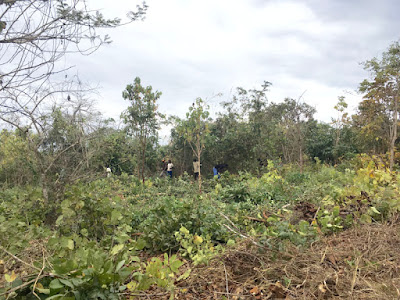We arrived in Nanua, about 45 minutes from our home,
midmorning on Monday. Armed with hoes, a machete and a grass cutter, we were
going to talk to the locals about helping us clear the land that was overgrown
with small trees, bamboo and tall grass.
Living in Moz, you hear people talk about the “bush bush”. They
are usually referring to green property that is typically farther out from
town. This property is the perfect example of the bush bush.
As we walked through the small village of Nanua to our
property, the trail of hopeful workers kept growing behind us. Traversing
through the bush bush, getting whipped by thorns and small branches from the
person in front of you, with a large group of men all armed with machetes who didn’t
speak my language, I thought to myself, “If we didn’t know a few of these guys,
this would probably be the scariest day of my life.”
Each time we go to Nanua, Nunu figures out who speaks the
best Portuguese and that guy becomes our point person. Having Latino, a fluent
Macua (local tribal language) speaker, is always great because he understands
what everyone is saying. On days like this one, we get a good laugh. One of the
guys asked someone where the driver was, referring to Nunu.
 |
| Nunu & Latino talking to all the men with machetes. |
While the property is huge, we didn’t know just how big it
was because it’s difficult to really measure in the bush. I knew that it would
be costly to have these men clear it, though. During the negotiations, they came
up with 30,000 mzn to clear the whole property. It’s really hard to explain the
cost of things right now, because the dollar is SO strong (we get more than
double the mzn than we did less than 2 years ago). We typically see the mzn
price and go “Oh that’s too much!” but then we think in USD and get excited
because it’s actually really cheap. It’s much easier to explain mzn amounts in
terms of what we pay our guard. He makes 3,000 mzn a month, which is a normal
wage for that kind of a job.
Even though 30,000 mzn is actually a good price for ALL of
that work, at just under $500 USD, we just didn’t have that much, so we made a
deal for them to do half of the property for 15,000 mzn. Before we even gave
the go-ahead to show the managers where the property lines are, the guys started
going. There were 15 guys total and they just took over, decimating the trees.
For you nature lovers who are wincing at the thought of so
many trees being cut down, we plan to use them to build animal shelters on the
property and we aren’t cutting any of the big trees down, just the small ones
that were a few inches in diameter. By doing this we should be able to build
sooner and will avoid having to try to come up with the money for the materials
to build.
Sandy, Matthew (our visitors) and I had farming hoes and,
while they aren’t ideal, we realized that we could cut away all the grass and
even take out some of the small trees. It was the perfect working day, totally
overcast with a little breeze. I’m not going to lie, there were moments before
we started working that I was actually cool. Being cool during the day in Moz…
this is a first for me, but what can I say? We’ve had a “cold snap.”
 |
| Matthew! |
At the end of the work day, we had made a huge dent in the
property, but this was not our greatest impact that day. Three white people in
Nanua at the same time is likely to be a record for this village. Not to
mention three white people who were working alongside locals rather than just
sitting and pointing, which was also a first. The locals were talking with
Latino and said, “We can tell they don’t despise us.” While that might not translate
very well, it basically meant that because we worked, they could tell we valued
them, or that we are good people.






